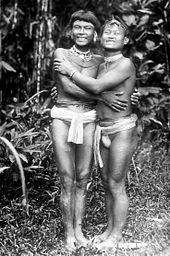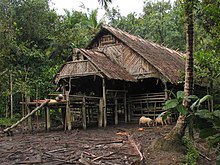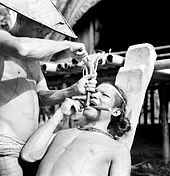Mentawai (people)
The Mentawai (also Mentawei or Mentawi ) are an ethnic group on the Mentawai Islands in the Indonesian province of West Sumatra and are considered to be their indigenous people .
The Mentawai live as semi-nomads in the coastal and rainforest areas. They are about 64,000 people. The Mentawai language is one of the Austronesian languages .
history
Presumably, the Mentawai originally came from Sumatra and moved via Nias to the then hardly populated islands of Siberut . Since the 1970s, the company has been in conflict with measures taken by the Indonesian government on several occasions and has been fighting to preserve its culture ever since. For example, large areas of the Mentawai habitat are cleared for the extraction of palm oil with state licenses. The communities are also being pushed back by the increased migration of Indonesians from Java , which led to programs such as the Transmigrasi project , in which 20,000 Mentawai were relocated by the Indonesian government.
Under the influence of Indonesia's Islamic society, the Mentawi are also confronted with missionary work . In the interests of Islam, they have been banned from raising pigs and a dress code has been imposed.
Culture and society
The Mentawi live in a class and hierarchy-free society and cultivate a pronounced spirituality. Their animistic traditional religion deals mainly with the nature spirits, namely those of the sky, the earth, the sea and the jungle. Humans, animals and plants have a soul in it . Evil spirits are considered to be the cause of illness. Special respect is due to the shamans , who are the only ones who perform the ritual dance.
In a traditional Mentawai settlement, the “Uma” serves as a central meeting and community center and a spiritual retreat for making offerings. Around the Uma are the single-family dwellings known as Laleps and also equipped with altars. Houses without an altar are called rusuk.
The Mentawai live as hunters and gatherers and keep pets such as pigs, dogs and chickens. The women are responsible for collecting fruits and mussels and catching crustaceans and fish, while the hunt and cattle breeding is the job of the men. The most important nutritional component is sago obtained by both sexes .
Traditional clothing is the loincloth , which has been largely replaced by modern clothing such as pants and T-shirts.
Body modifications
Similar to other indigenous peoples of Southeast Asia, the Mentawai also practice a form of cosmetic dental treatment in which the shape of the teeth is permanently changed (similar to the Aeta and the Philippine tribal tattoo ). They also decorate the body and face with special tattoos , some of the oldest in history. They serve both as a beauty mark and as a balance between body and universe. According to the Mentawai belief, they can also be recognized by their ancestors' tattoos after their death.
The patterns of the tattoos are supposed to recreate the shape of a sago tree and other plants and are understood as a symbol of strength. The semicircular lines on the chest stand for the flowering of the plant. Annular stripes on the legs simulate the trunk. Further patterns on and hands symbolize the bark.
The initially drawn tattoos are traditionally engraved with a thorn from the lemon tree . To do this, the branch equipped with the thorn is held against the skin and hit the skin with a second branch with hammer blows, whereby the thorn sticks the color under the skin. However, the device can also be copied with a nail. The freshly made tattoo is then cleaned with medicinal herbs and water to prevent infections.
However, influenced by modern society, these traditional modifications are becoming increasingly less important.
See also
Web links
- Lars Krutak : Spirit tattoos of the Mentawai shaman ( Memento from October 18, 2009 in the Internet Archive ) (English)
Individual evidence
- ↑ a b c Mentawai ( Memento from July 8, 2012 in the Internet Archive )
- ↑ a b Magic leaves for the dugout canoe , 3sat
- ^ The Mentawai Future: Social Structure , nativeplanet.org
- ^ Mentawai Project: The Uma Project , nativeplanet.org
- ^ The Mentawai Future: Modern Clothing , nativeplanet.org
- ^ Lars Krutak: Tattoo Hunter - Mentawai , 2009


